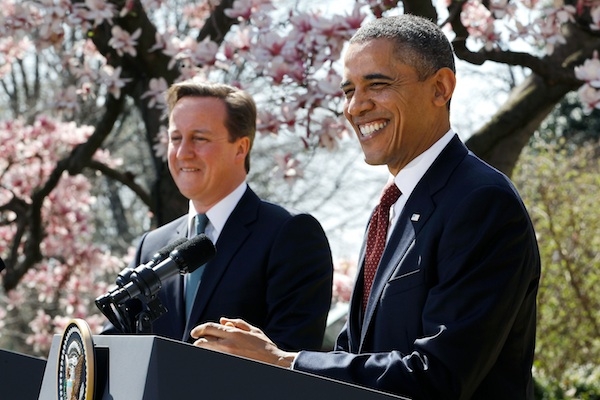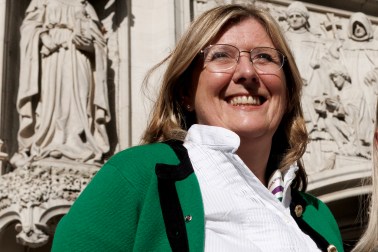Four years ago, in opposition, the Cameron offices were a swing state in the US election. Most were for Obama but there was still a sizable number who held a torch for John McCain. But this time round it is hard to think of anyone in Downing Street who wanted a Romney win. I asked several people in No. 10 who would have voted for Romney, but only one name ever came up.
The idea of a Tory Downing Street urging on a Democratic President would come as a shock to those who served in the Thatcher and Major governments. In the 1980s, Ronald Reagan and Margaret Thatcher had common foes at home and abroad. But it would be a mistake to think that the relationship between Tories and the Republican party went into decline when they both left office. Instead, it got even closer.
In 1992, the Major government provided such help to George H.W. Bush’s re-election campaign that Bill Clinton held it against Britain for the first half of his presidency. This led to one of the postwar low points in the special relationship: the decision to grant Gerry Adams a US visa in 1994, before the Sinn Fein leader had renounced violence.
When both parties were in opposition, they still looked to each other for help. William Hague and his team paid a reverential visit to George W. Bush when he was still governor of Texas and considering a tilt at the presidency.
Even today, the Tories and Republicans are sister parties — they’re both members of the International Democratic Union. The then Tory chairman Baroness Warsi led a sizable delegation to the Republican convention this September. There might not be the same intellectual exchange between the two parties as there was in the 1980s, but the ‘compassionate conservatism’ agenda is still a direct import from the States.
But the Cameroons and the Obama administration are bound together by something deeper than joint membership of the International Democratic Union — the ties of office. They are both incumbents at a time when it has often appeared that to govern is to lose. Since the collapse of Lehman Brothers in 2008, 17 European governments have been ejected from office and an incumbent party has lost the White House.
As the results dribbled in through the wee hours of Wednesday morning, there was a sense of relief among Cameron’s circle that Obama had demonstrated that an incumbent could win even in these tough economic times. They were particularly cheered by Obama’s success in persuading voters that he needed more time to clean up the mess left by the last lot. A British version of this message will be central to the Tories’ campaign in 2015.
One senior Labour figure who was paying close attention to the race remarked nervously that, ‘George Osborne is watching this election like a hawk. He’s going to run the same campaign against us.’
On one level, Obama with his stimulus plan is an odd inspiration for an austerity government. The appeal of this victory to the Tories is that Obama has been forced to jettison many of his early promises on the economy, but has still managed to win the economic argument by attacking his opponent on the grounds that he represents a return to the policies that caused the crisis. As Downing Street contemplates financial projections that show how unlikely it is that they will meet their fiscal rule of having the national debt falling as a percentage of GDP by the next election, this is particularly reassuring.
When Cameron’s team was preparing for conference this year they drew inspiration from Obama’s convention speech. It was the best example they could find of how to make the case that, while things may be tough, the country is getting back on track.
Obama’s re-election also ensures that the special relationship will remain uncontroversial. One man who knows his way to Vauxhall Cross explained Downing Street and the security establishment’s enthusiasm for Obama thus: ‘The Americans are still doing most of the same stuff they did under Bush, targeted drone strikes and all that. But no one seems to mind because it is a black, Democratic President. If Romney wins, though, the whole stop-the-war lot will be out in force straight away.’
Then, there is the important issue of Iran. One Cameron ally concedes that ‘the worst of all worlds for us would have been Romney bombing Iran and us looking like poodles for going along with it’.
Perhaps, though, the real driver for Cameroon Obama enthusiasm is the belief that he can, as he has in the past, help them politically. In 2008, Obama did Cameron the honour of treating him with the same respect that he had the sitting Prime Minister Gordon Brown. Tory strategists were so pleased with the meeting that they purchased a whole series of internet adverts to ensure that as many voters as possible saw it. Cameron himself rushed out a web video to commemorate the occasion.
The now Prime Minister returned some of the favour this year. His visit to the United States this spring became part of the Obama re-election campaign. The President’s bond with this English Conservative emphasised that it was the Republicans, not him, who were outside the mainstream. Cameron even flew with Obama to the swing state of Ohio to watch a college basketball game, an action that sent many Republicans into -apoplexy.
The protocol of the world leaders’ club means that an Obama visit to Britain in 2014 or 2015 with some warm words about the Prime Minister is now almost certain. This, of course, isn’t going to swing a British election on its own. But every little helps.
Obama has succeeded in uniting the leaderships of all three main parties in Britain; they all wanted him to make it back to the White House. But it is the Tories who will gain the most succour from his victory: the cycle of incumbent loses has now been broken. They also will be the ones who derive the most practical benefit from it.







Comments